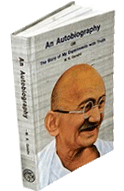
P.O. SEVAGRAM, DIST.WARDHA 442102, MS, INDIA. Phone: 91-7152-284753
FOUNDED BY MAHATMA GANDHI IN 1936
AN AUTOBIOGRAPHY
THE STORY OF MY EXPERIMENTS WITH TRUTH
By M. K. Gandhi

AN AUTOBIOGRAPHY
OR
THE STORY OF MY EXPERIMENTS WITH TRUTH
M. K. Gandhi
Published by :
Navajivan Publishing House,
Ahmedabad,
India
Pages : 507 + 12 (Hard Bound)
464 + 15 (Paperback)
Price : INR 100/- (Hard Bound)
INR 50/- (Paperback)
Mahatma Gandhi's autobiography Sathiya Sodhani is one book which guides you as to what is right and wrong. Most importantly, the author should have experienced all these. The original was in Gujarati, and was later translated into English and other Indian languages. The book is in five parts, beginning with his birth, up until the year 1921. In the last chapter he writes, "My life from this point onward has been so public that there is hardly anything about it that people do not know...."
The introduction reads, "What I want to achieve - what I have been striving and pining to achieve these thirty years - is self-realization, to see God face to face, to attain Moksha. I live and move and have my being in pursuit of this goal."
The paper back edition of the book costs Rs. 30 being subsidized by the Navajivan Trust, Ahmedabad.
Chapter :124 The First Experience
Before I reached home, the party which had started from Phoenix had already
arrived. According to our original plan I was to have preceded them,
but my preoccupation in England with the war had upset all our
calculations, and when I saw that I had to be detained in England
indefinitely, I was faced with the question of finding a place for
accommodating the Phoenix party. I wanted them all to stay together
in India, if possible, and to live the life they had led at Phoenix.
I did not know of any Ashram to which I could recommend them to go,
and therefore cabled to them to meet Mr. Andrews and do as he
advised.
So they were first put in the Gurukul, Kangri, where the late Swami
Shraddhanandji treated them as his own children. After this they
were put in the Shantiniketan Ashram, where the Poet and his people
showered similar love upon them. The experiences they gathered at
both these places too stood them and me in good stead.
The Poet, Shraddhanandji and Principal Sushil Rudra, as I used to
say to Andrews, composed this trinity. When in South Africa he was
never tired of speaking of them, and of my many sweet memories of
South Africa, Mr. Andrews' talks, day in and day out, of this great
trinity, are amongst the sweetest and most vivid. Mr. Andrews
naturally put the Phoenix party in touch with Sushil Rudra.
Principal Rudra had no Ashram, but he had a home which he placed
completely at the disposal of the Phoenix family. Within a day of
their arrival, his people made them feel so thoroughly at home that
they did not seem to miss Phoenix at all.
It was only when I landed in Bombay that I learnt that the Phoenix
party was at Shantiniketan. I was therefore impatient to meet them
as soon as I could after my meeting with Gokhale.
The receptions in Bombay gave me an occasion for offering what might be called a
little Satyagraha.
At the party given in my honour at Mr. Jehangir Petit's place, I did
not dare to speak in Gujarati. In those palatial surroundings of
dazzling splendour I, who had lived my best life among indentured
labourers, felt myself a complete rustic. With my Kathiawadi cloak,
turban and dhoti, I looked somewhat more civilized than I do today,
but the pomp and splendour of Mr. Petit's mansion made me feel
absolutely out of my element. However, I acquitted myself tolerably
well, having taken shelter under Sir Pherozeshah's protecting wing.
Then there was the Gujarati function. The Gujaratis would not let me
go without a reception, which was organized by the late Uttamlal
Trivedi. I had acquainted myself with the programme beforehand. Mr.
Jinnah was present, being a Gujarati, I forget whether as president
or as the principal speaker. He made a short and sweet little speech
in English. As far as I remember most of the other speeches were
also in English. When my turn came, I expressed my thanks in
Gujarati explaining my partiality for Gujarati and Hindustani, and
entering my humble protest against the use of English in a Gujarati
gathering. This I did, not without some hesitation, for I was afraid
lest it should be considered discourteous for an inexperienced man,
returned home after a long exile, to enter his protest against
established practices. But no one seemed to misunderstand my
insistence on replying in Gujarati. In fact I was glad to note that
everyone seemed reconciled to my protest.
The meeting thus emboldened me to think that I should not find it
difficult to place my new-fangled notions before my countrymen.
After a brief stay in Bombay, full of these preliminary experiences,
I went to Poona whither Gokhale had summoned me.